

List of cognitive biases. Systematic patterns of deviation from norm or rationality in judgment The loss aversion cognitive bias has been shown in monkeys Cognitive biases are systematic patterns of deviation from norm and/or rationality in judgment. They are often studied in psychology and behavioral economics.[1] Although the reality of most of these biases is confirmed by reproducible research,[2][3] there are often controversies about how to classify these biases or how to explain them.[4] Gerd Gigerenzer has criticized the framing of cognitive biases as errors in judgment, and favors interpreting them as arising from rational deviations from logical thought.[5] Explanations include information-processing rules (i.e., mental shortcuts), called heuristics, that the brain uses to produce decisions or judgments.
There are also controversies over some of these biases as to whether they count as useless or irrational, or whether they result in useful attitudes or behavior. Dunning–Kruger effect. Cognitive bias in which people with low ability at a task overestimate their ability In the field of psychology, the Dunning–Kruger effect is a cognitive bias in which people with low ability at a task overestimate their ability.
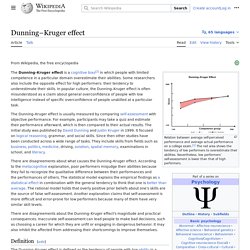
It is related to the cognitive bias of illusory superiority and comes from the inability of people to recognize their lack of ability. Without the self-awareness of metacognition, people cannot objectively evaluate their competence or incompetence. Winner's curse. The winner's curse is a phenomenon that may occur in common value auctions with incomplete information.
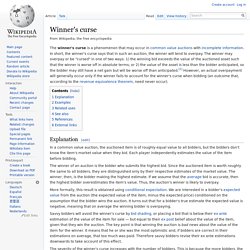
In short, the winner's curse says that in such an auction, the winner will tend to overpay. The winner may overpay or be "cursed" in one of two ways: 1) the winning bid exceeds the value of the auctioned asset such that the winner is worse off in absolute terms; or 2) the value of the asset is less than the bidder anticipated, so the bidder may still have a net gain but will be worse off than anticipated.[1] However, an actual overpayment will generally occur only if the winner fails to account for the winner's curse when bidding (an outcome that, according to the revenue equivalence theorem, need never occur). Explanation[edit] In a common value auction, the auctioned item is of roughly equal value to all bidders, but the bidders don't know the item's market value when they bid. Winner's curse Wiki. Magic: The Gathering. Magic: The Gathering (MTG; also known as Magic) is a trading card game created by Richard Garfield.
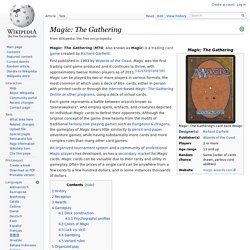
First published in 1993 by Wizards of the Coast, Magic was the first trading card game produced and it continues to thrive, with approximately twelve million players as of 2011[update].[1][2][3][4][5][6][7][8] Magic can be played by two or more players in various formats, the most common of which uses a deck of 60+ cards, either in person with printed cards or through the Internet-based Magic: The Gathering Online or other programs, using a deck of virtual cards. History[edit] Richard Garfield was a doctoral candidate at University of Pennsylvania when he first started to design the game. During his free time he worked with local volunteer playtesters to help refine the game. He had been brought on as an adjunct professor at Whitman College in 1991 when Peter Adkison (then CEO of Wizards of the Coast games company) first met with Garfield to discuss Garfield's new game RoboRally.
Dota 2 Wiki. Multiplayer online battle arena video game Gameplay.
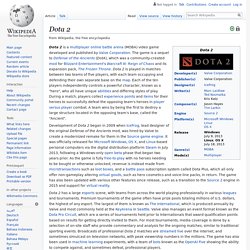
Riot Games Wiki. Riot Games is an American video game publisher that was established in 2006.
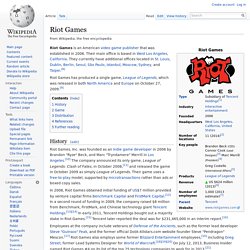
Their main office is based in West Los Angeles, California. They currently have additional offices located in St. Louis, Dublin, Berlin, Seoul, São Paulo, Istanbul, Moscow, Sydney, and Taipei.[8] Riot Games has produced a single game, League of Legends, which was released in both North America and Europe on October 27, 2009.[9] History[edit] Riot Games, Inc. was founded as an Indie game developer in 2006 by Brandon "Ryze" Beck, and Marc "Tryndamere" Merrill in Los Angeles.[10] The company announced its only game, League of Legends: Clash of Fates, in October 2008,[11] and released the game in October 2009 as simply League of Legends.
On November 8, 2013 Riot Games announced that the company would relocate to a new building in West Los Angeles in 2015.[22] Game[edit] Distribution[edit] In Europe, Riot Games originally signed an international licensing partnership with GOA, a division of Orange S.A.. The King of Fighters Wiki. The King of Fighters (ザ·キング·オブ·ファイターズ, Za Kingu obu Faitāzu?)
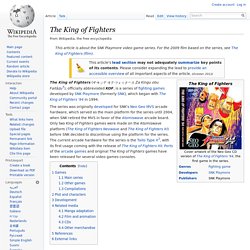
, officially abbreviated KOF, is a series of fighting games developed by SNK Playmore (formerly SNK), which began with The King of Fighters '94 in 1994. Games[edit] Main series[edit] Other games[edit] Street Fighter Wiki. Street Fighter (ストリートファイター, Sutorīto Faitā?)
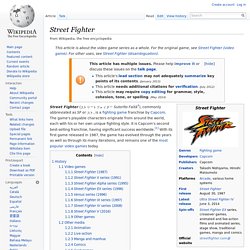
, commonly abbreviated as SF or スト, is a fighting game franchise by Capcom. The game's playable characters originate from around the world, each with his or her own unique fighting style. Tekken Wiki.